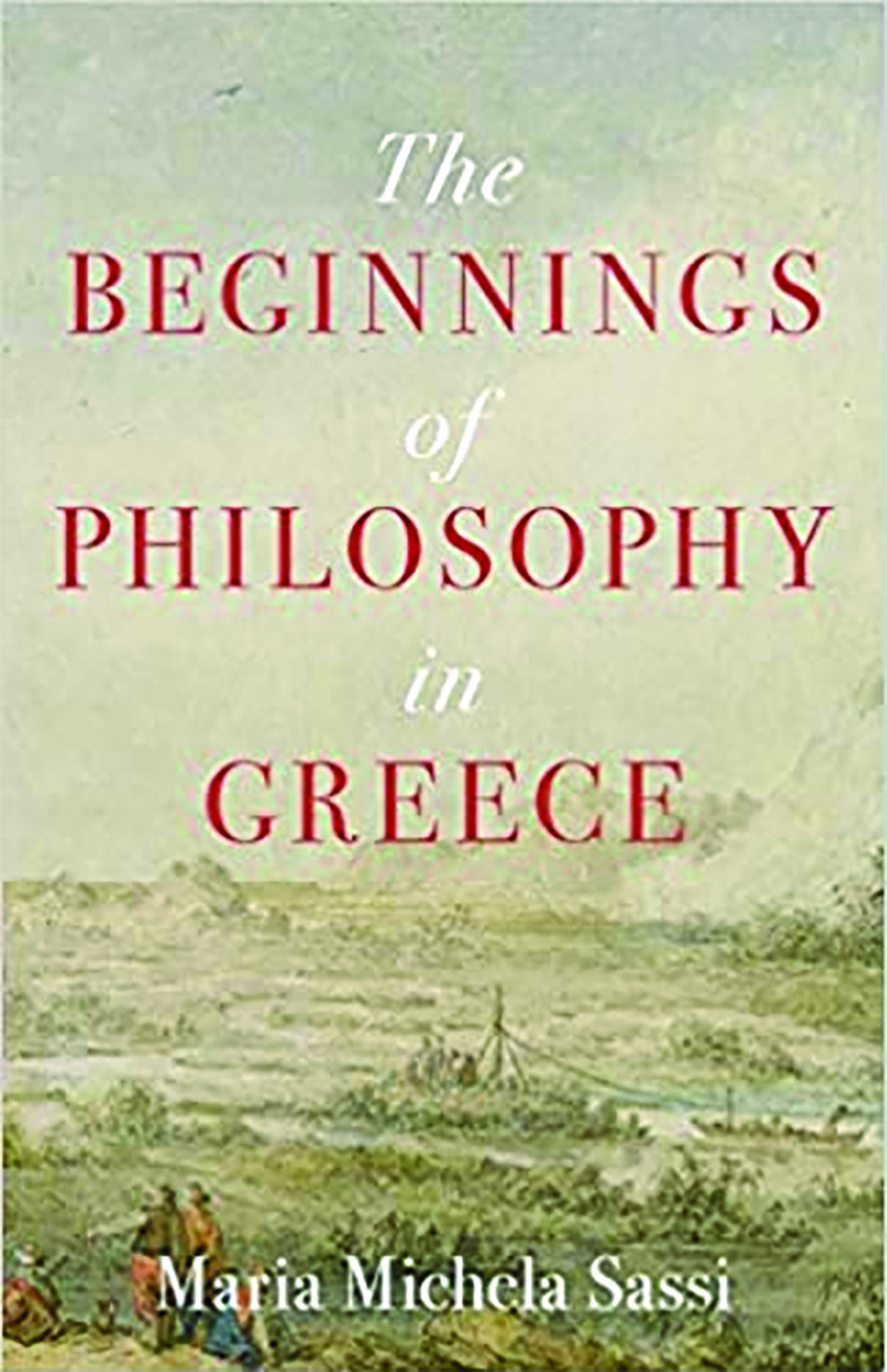There’s a charmingly frenetic Youtube video with more than 87 million views called “history of the entire world, i guess.” The cartoon begins in the silence before matter existed and moves through time all the way up to gene editing and the internet. Somewhere in the middle, in what philosopher Karl Jaspers and others have called the Axial Age (the eighth century to the third century BCE), a detail from Raphael’s “The School of Athens” appears, and the understated narrator says, “Ah! The Greeks just had the idea of thinking about stuff.” It’s silly, of course, and self-conscious about being an oversimplification, but it only works as a joke because it’s an accurate depiction of how most people think about the Greeks and philosophy. After thousands upon thousands of years of human civilization, a man named Socrates suddenly decided one day, almost through sheer force of will, to begin thinking.
These popular oversimplifications are why books such as Maria Michela Sassi’s The Beginnings of Philosophy in Greece are so important. Even if it’s a bit dense and slightly too academic to make for casual reading, the book is worth the effort for anyone interested in disabusing themselves of the notion that all human thought and logic begins with Socrates. Sassi, who teaches the history of ancient philosophy at the University of Pisa, simultaneously explores pre-Socratic changes in Greek thought and the modern development of its academic study. It’s like a narrow, professional story framing a vast cultural epic — the picture is larger than the frame. But the takeaway from both elements of the story is the same: Every beginning has its own beginning, trailing away to the unverifiable past. The main question that Sassi explores is whether the works of such pre-Socratic thinkers as Hesiod, Anaximander, and Heraclitus should be considered philosophy.

The use of “beginnings” in the title is intentionally plural. As Sassi writes in the introduction, “I prefer to speak of a plurality of beginnings of philosophy in Greece, and I trace its various beginnings in different contexts and different periods.” Throughout much of the book, this translates to tracking all the various sources of Greek myth in past Middle Eastern civilizations and then demonstrating the ways in which mythical thinking was replaced with “natural,” or what we might call secular, thought. In the interest of subtlety, Sassi maintains that while Greek philosophical discourse certainly marked a unique and new achievement, its theories concerning the origins of the universe have roots “so remote, in fact, that we must look for them elsewhere, be it in Egypt or the Near East. When it comes to philosophy … the exploration of the philosophical contents of myth undermines the very foundations of the paradigm of a Greek origin of philosophical reasoning.”
So the Greeks got their myths from the Egyptians, but the Egyptians never had an Aristotle (that we know of). Why? As Sassi argues, something unique happened with the naturalistic thought of the early Greeks. The “real significance and innovation” of their thought, she argues, is in developing a notion of nature that “pivots around the idea of an internal regularity independent of the intervention of supernatural forces.” In other words, the Greeks were the first to think about the world and nature as things that can be explained without reference to mythology or religion. They were, Sassi argues, the first secular thinkers.
In this, Sassi would seem to agree with Aristotle, who called Thales (625 BCE-546 BCE) the “father of philosophy” because he was the first to break from a purely mythical recounting of the origins of the cosmos, theorizing that the universe derived from water and not from the will of an anthropomorphic force.
But the question Sassi seems to be really asking with this book is, “What is philosophy?” To her credit, she herself notes “the inseparability of the issue of the beginnings of philosophy and that of the nature of philosophy itself.” But then, she narrows her sense of what philosophy is, defining it as thought with “critical intent directed toward traditional, or at any rate established, points of view” and discourse written in “an argumentative” mode. Does that describe philosophy? Sure. But it’s not inclusive enough. Lying outside of Sassi’s bandwidth would be philosophers such as Friedrich Nietzsche, who wrote in an aphoristic mode, and Thomas Aquinas, who tended to support rather than criticize tradition. It seems that what Sassi is really looking for are intimations not of philosophy but of a kind of secular, post-Enlightenment worldview.
The Beginnings of Philosophy in Greece is a fascinating book for someone who already knows a bit about Greek history and wants to brush up on the story of how certain modern scholars came to think about the development of Greek thought. Much of the latter is, unfortunately, inside baseball for classics departments, but embedded within that rarified narrative are interesting observations about Greek thought itself, particularly the extent to which its mythology was borrowed from Egypt and the larger Middle East. The book’s narrow focus is its virtue but also its weakness. Being the story of how certain modern scholars trace the evolution of Western thought, it doesn’t necessarily have the ability to stop and daydream about the larger implications of thought itself. If it did, it might have taken into account definitions of philosophy diametrically opposed to its own, such as philosopher Graham Harman’s insistence that the roots of philosophy come from metaphor, not literal language, or the Candian poet Robert Bringhurst’s work on the philosophical thought embedded in the myths of indigenous North American tribes.
In other words, Sassi does an excellent job writing about how historians classify thought, but she has a bit of trouble interrogating her own assumptions about philosophy. Ultimately, you have to do philosophy yourself to understand it.
Scott Beauchamp is the author of Did You Kill Anyone? and the novel Meatyard: 77 Photographs. He lives in Maine.
